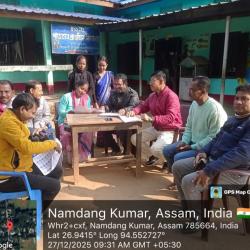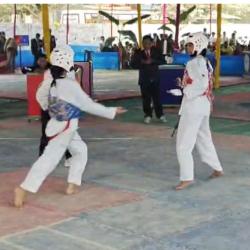With the demand of a Separate State for the two hills, Karbi Anglong and Dima Hasao, the Hill State Democratic Party and Dimasa Women Society submitted jointly a memorandum to the Union Home Minister, Sri Sushil Kumar Sinde through eh Deputy Commissioner, Dima Hasao District on Saturday.
In this connection a procession led by HSDP, President, Suraj Naiding, Secretary Jayanta Nunisa, President, Dimasa Women Society Smt Nibita Langthasa and others was taken out at Haflong from the office of the Hill State Democratic Party marched through the major parts of Haflong town reached the office of the Deputy Commissioner, Dima Hasao district. They were shouting ‘No Separate State, No rest’ etc etc.
Later on they submitted the memorandum which detailed their justification for the demand of a separate for the twin hill district of Assam. The memorandum maintained that no matter how graciously and innovatively the Union Home Ministry might have attempted through signing of accords, firstly in 1995 and secondly in 2011, to resolve the existential concerns of the people of the said two hill areas within the State of Assam, the reality of a discordant co-existence between the people of the hills and the plains in the State remain incorrigible. This is a fact indelibly tainted in the history of generations of the State's existence an amongst the plethora of 'special problems' known to be afflicting specific areas and regions of the Country, this too had to be accepted as a special problem attributable to the State of Assam at on point in time which, to resolve it, was considered expedient to create the States of Meghalaya, Mizoram and Nagaland; and now again, for the sake of peace and lasting solution, must be revisited and reconsidered to resolve the longstanding problem of the hill people of the said two remaining hill areas in the State of Assam.
The political prudence of the Union Government in dealing with the hill areas of the State, however, may not be questioned in history because while it had considered relocation of the hill areas, particularly the Khasi and Jaintia Hills, the Garo Hills and the Mizo Hills outside the administrative purview of the Government of Assam as the only available solution to resolve the said 'social problem'. it also believed that the other two hill areas; namely Mikir Hill (now renamed Karbi Anglong) and North Cachar Hills (now renamed Dima Hasao), though seemingly non-separatists at that point of time should be asked to exercise the option whether or not to remain in the State. That perception was formally articulated in the second paragraph of the Assam Reorganisation Act, 1969 which was enacted to launch the innovative Constitutional provision of Article 244 (A) and whose noble objective was, however, defeated by the pro-active anti-autonomy manipulations and politics played out by the plains leaders of the State at that time. Sadly, the belief and the conviction of the Union Government of that time have been in subsequent years ironically vindicated by the repeated violence, mayhem and continued social unrest in the said two hill areas during the years gone by with no hope of a peaceful end in sight. That is why the attempt of the Union Government which in partnership with the State Government has sought to end the violence and unrest in the two hills through the MoU signed on 1st April 1995 and the MoS signed on 22nd November 2011 were proven feeble and ineffectual because the State Government has been found time and again that it is an untrustworthy ally in the implementation, in letter and spirit, of the provisions of the said accords. In the face of the duplicity and manipulative tactics adopted by the State Government, both the accords are already doomed to die a natural death.
That is why the undersigned, mostly signatories of the MoU of 1995 and the MoS of 2011, strongly believe that a fresh attempt needs to be made to secure a future of trust, dignity and opportunity for the people of the said two hill areas so that like in the rest of this great Country they also may become proud and dignified citizens which the accords have been expected to secure for them but have failed miserably due to the disloyalty of the State Government to the terms and the spirit of the agreements. Predictably the struggle for control of the hill areas and therefore the clash of interest between the state government and the hill people in the post accord scenario push back the situation to uncertainty and unrest.
Thus in the 27years of the people's struggle for genuine autonomy in the form of the demand for the implementation of Article 244 (A) of the Indian Constitution certain truths have prominently emerged - firstly, the plainsman leadership has never accepted and will never accept his relation with the Hillman as 'partners' and has always striven and will always strive to uphold the relationship of 'the ruler and the ruled'; that is why any settlement within the framework o the State of Assam is fraught with the risk of failure; and secondly, the fiercely independent and democratic social tradition of the hill people will never accept a position less than self-determining their social and political destiny, that is why in spite of the MoU having been signed manifestation like 'Dimaraji' and 'Hemprek Kangthim' have emerged.
Therefore, as 'Autonomous Statehood' Under Article 244 (A) Of The Constitution Of India having been effectively ruled out by the government and an solution devised within the framework of the state of Assam having been rendered ineffectual by the state's usurpative tradition, the only sustainable solution remain the complete separation of the said two hill areas from the state of Assam and the and the creation of a separate state for the said areas under the provision of article 3 of the constitution of India.
Hence in the interest of peace and fulfillment of the said hill people and in the interest of a peaceful and vibrant Indian Nationhood, the people of Karbi Anglong and Dima Hasao formally place the demand for SEPARATE STATE for the two hills and humbly seeking his kind initiative towards positive consideration of the demand thus placed here this on the second Day of February, 2013 through the Deputy Commissioner of Dima Hasao, Haflong, Assam.
- 7880 reads










Add new comment